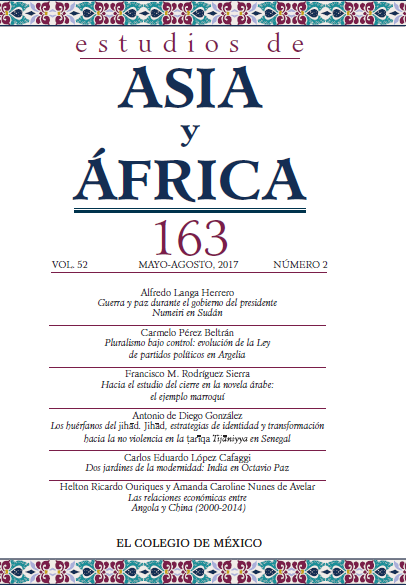Abstract
This article analyses the government of President Gaafar Muhammad al-Nimeiry (1969-1985) in the Republic of Sudan, taking into account the evolution of armed conflicts in the country as well as peace initiatives launched during this period. From a historical point of view, it examines the success of the May Revolution and the grea expectations it created within and outside of the country, as well as the different phases of Nimeiry’s leadership and his transformation from socialist to Islamic leader. The article emphasizes the consequences of this transformation and the subsequent fiasco of decentralization, resulting in a scenario of conflict, especially in the south of the country
References
An Naim, Abdullahi, “Translator’s Introduction”, en Mahmoud Mohamed Taha, The Second Message of Islam, Siracusa, Syracuse University Press, 1987, pp. 1-4.
Beshir, Mohamed Omer, The Southern Sudan. From Conflict to Peace, Londres, C. Hurst & Co. Ltd., 1975.
Burr, James Millard y Robert Collins, Revolutionary Sudan. Hasan al-Turabi and the Islamic State, 1989-2000, Leiden, Brill, 2003.
Cortés López, José Luis, Historia contemporánea de África. De Nkrumah a Mandela, Madrid, Mundo Negro, 2001.
De Waal, Alexander, Famine Crimes. Politics and the Disaster Relief Industry in Africa, Oxford-Bloomington, James Currey-Indiana University Press, 1997.
Díez Alcalde, Jesús y Félix Vacas Fernández, Los conflictos de Sudán, Madrid, Instituto de Estudios Internacionales y Europeos “Francisco De Vitoria”-Ministerio de Defensa, 2008.
Flint, Julie y Alexander de Waal, Historia breve de una larga guerra, Barcelona, Intermón Oxfam Ediciones, 2007.
Fluehr-Lobban, Carolyn, Richard A. Lobban y John Obert Voll, Historical Dictionary of the Sudan, 2ª ed., Londres, The Scarecrow Press, Inc., 1992.
Frente Islámico Nacional, Sudan Charter, National Unity and Diversity, Jartum, enero de 1987.
Holt, Peter Malcolm y Martin Daly, The History of the Sudan, Londres, The Weidenfeld & Nicolson, 1979.
Ibrahim, Abdullahi, “A Theology of Modernity: Hasan al-Turabi and Islamic Renewal in Sudan”, Africa Today, vol. 46, núm. 3/4, 1999, pp. 208-214.
Johnson, Douglas, The Root Causes of Sudan’s Civil Wars, KampalaSuffolk, Fountain Publishers-James Currey, 2011.
Khalid, Mansour, Nimeiri and the Revolution of Dis-May, Londres, Kegan Paul International Ltd., 1985.
Khalid, Mansour, The Government They Deserve. The Role of the Elite in Sudan’s Political Evolution, Londres, Kegan Paul International Ltd., 1990.
Niblock, Tim, Class and Power in Sudan. The Dynamics of Sudanese Politics, 1898-1985, Londres, MacMillan Press Lt., 1988.
Ortega Rodrigo, Rafael, El movimiento islamista sudanés. Discursos, estrategias y transformaciones, Alcalá la Real, Alcalá Grupo Editorial, 2010.
Prunier, Gerard, Darfur. The Ambiguous Genocide, Londres, Hurst and Company Publishers, 2005.
Rone, Jemera, “Sudan: Oil & War”, Review of African Political Economy, vol. 30, núm. 97, septiembre de 2003, pp. 504-510.
Sylvester, Anthony, Sudan under Nimeiri, Londres, The Bodley Head Ltd., 1977.
Verhoeven, Harry, “Climate Change, Conflict and Development in Sudan: Global Neo-Malthusian Narratives and Local Power Struggles”, Development and Change, vol. 42, núm. 3, mayo de 2011, pp. 679-707.
Wohlmuth, Karl y Dirk Hansohm, Sudan: A Case for Structural Adjustment Policies, Sudan Economy Research Group Discussion Paper núm. 8, Bremen, Universidad de Bremen, 1986.
This work is licensed under a Creative Commons Attribution-NonCommercial-NoDerivatives 4.0 International License
Copyright 2022 Estudios de Asia y África


